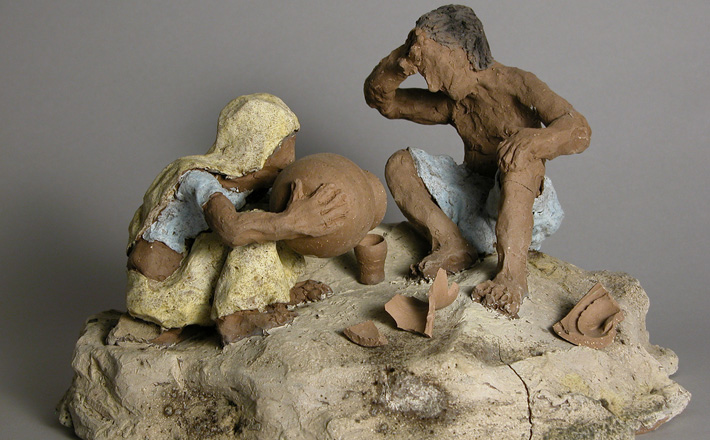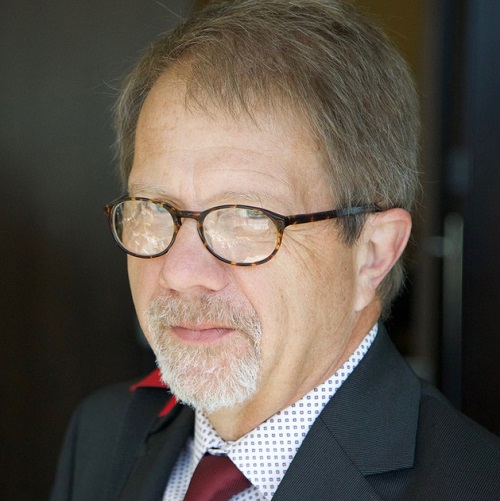Commentary on Psalm 63:1-8
Psalm 63 offers minimal words for a minimal place where experience is anything but minimal. The Psalmist’s poetics here are like a minimalist painting that shows only one or two strokes of paint across a field of white.
For example, Franz Kline, an American abstract expressionist painter of the mid-twentieth century, was fond of bold strokes of black across white canvas.1 His was an appeal to universal ideas that transcended conventional or easily describable ideas. The copying of something in every detail with paint on canvas didn’t offer enough space for creative play in the fields of imagination for the abstract expressionists.
The words of the Psalm are sparse like vegetation in a desert. They are not numerous. The Psalmist doesn’t heap words on words or concepts on concepts like some theological tome. Instead, they offer dashes of tone, or show glimpses of a plant’s roots grasping to a bit of soil blown between two rocks at the end of a dry riverbed. They invite reflection. They are enough.
Poets have a way of speaking truth in compact, yet expansive ways. Take for example an excerpt from a new translation by Mark S. Burrows of Rainer Maria Rilke’s poems. In the poem “Oh Say Poet” we read:
Oh say, poet, what you do?
I praise.
But what about the deadly and monstrous?
How do you keep going, how do you take it all in?
I praise.2
The difficult things in life are hard to endure. They can press on the chest like an asthma attack and you can’t find space to breathe. In the midst of them it can feel like you are running through a rain-soaked field of corn where each step gathers more mud on your legs. You stop in the middle from exhaustion and are not sure about the decision to cross the field after so much rain.
The psalmist — identified here as David — invites reflection about the tough places of human experience and the depths of relationship with the living God. The poetry plays a resonant chord that I think strikes home within the hearer’s mind. It is honest and open in its appraisal of human experience, the contours of theological imagination, and capacity for reflection about life issues in relationship with God. The words play like chords and melodic runs in Beethoven’s Fifth Symphony. They are familiar and have a capacity to touch listeners with musical truth that can speak to profound dimensions of human experience and thereby prompt reflection.
Thirsty?
John of the Cross, a sixteenth century poet mystic, reflected often on the arid places of human living. He wrote about them as places where the dark night of the soul can occur. The dark night about which he wrote could be described in various ways. For me, it is a place where God may seem absent or non-existent. It can be a place where the experience of abandonment is palpable. Yet, it is also a place where the dimensions of one’s personal theological understanding can be expanded. It is a place of growth in places where no growth seems possible. It is found in the desert.
In the desert is where we come to know what it means to be really thirsty. So parched that even water won’t quench the thirst. Here is where the Psalmist writes poetry — in the place of thirst where the mouth is full of cotton and no moisture can be discerned. Here is the place where God might be sought. When all of the well manicured defenses and accouterments of existence have been stripped away then the human spirit might be open to sensing the breeze of God’s spirit.
Love and Remembering
God’s love is better than life. The psalmist’s affirmation is the kind that generally doesn’t come easily. It is the kind of recognition that is born to people who have endured some type of hardship. This isn’t sweet sentimentalism or infatuation, but a depth of recognition about what is most important to know for fullness in human living. This is a love that will not let us go. Even if there are threats to our existence from forces beyond our control, the love of God for us remains in life and death.
We are privileged to know the stories of David’s life from Scripture. His was one of great faith and apostasy. He spanned a spectrum of human capacities for greatness and lowliness. His life included such sin as committing adultery with another man’s spouse, complicity in the murder of an innocent man, and exhibitions of unfaithfulness because of his power as king. He was a man like any other man in that he experienced the power of sin to corrupt life and rob joy.
What do you remember when you lay down on your bed before you drift to sleep? What thoughts are most prevalent? For the psalmist it seems that it was the memory of times when God seemed most present, most alive, and most real. The process of memory recall can bring to the present both the good and bad experiences of life. Here, the psalmist wants to focus on the good. The bad is everywhere around them and is the unspoken landscape from which the Psalm is composed. It doesn’t need to be stated. It is a recognizable reality.
Conclusion
The psalmist provides a poetry that sweeps hearers and readers into a new pattern of reflection. The poetry catches people where they live. In his poem, “Introduction to Poetry,” Billy Collins provides readers and hearers with a way toward reflecting on poetry as a means toward personal discovery by allowing the poetic language to mingle with our own language. Excerpts from the poem invite reflection on poetry as art that is more than the sum of words or a careful exposition of what the author must have meant. He writes,
I ask them to take a poem
and hold it up to the light
like a color slide
or press an ear against its hive…
I want them to water-ski
across the surface of a poem…
But all they want to do
is tie the poem to a chair with a rope
and torture a confession out of it.
They begin beating it with a hose
to find out what it really means.3
Like the psalmist, Collins calls for a finishing of the poem in the self. It is there that the big questions reside. It is there where poetry speaks its truth and invites others to run through its fields, fall exhausted from its sweltering heat, and feel the soft caress of rain on a tired face.
1Franz Kline’s work can be seen on the Museum of Contemporary Art (MOCA) website at http://www.moca.org/pc/viewArtWork.php?id=33 <accessed October 11, 2012>
2Rainer Maria Rilke, Prayers of a Young Poet, trans. Mark S. Burrows (Brewster, MA: Paraclete Press, 2012).
3Sam M. Intrator and Megan Scribner, Leading from Within: Poetry That Sustains the Courage to Lead (San Francisco, CA: Jossey-Bass, 2007), 214-215.


March 3, 2013